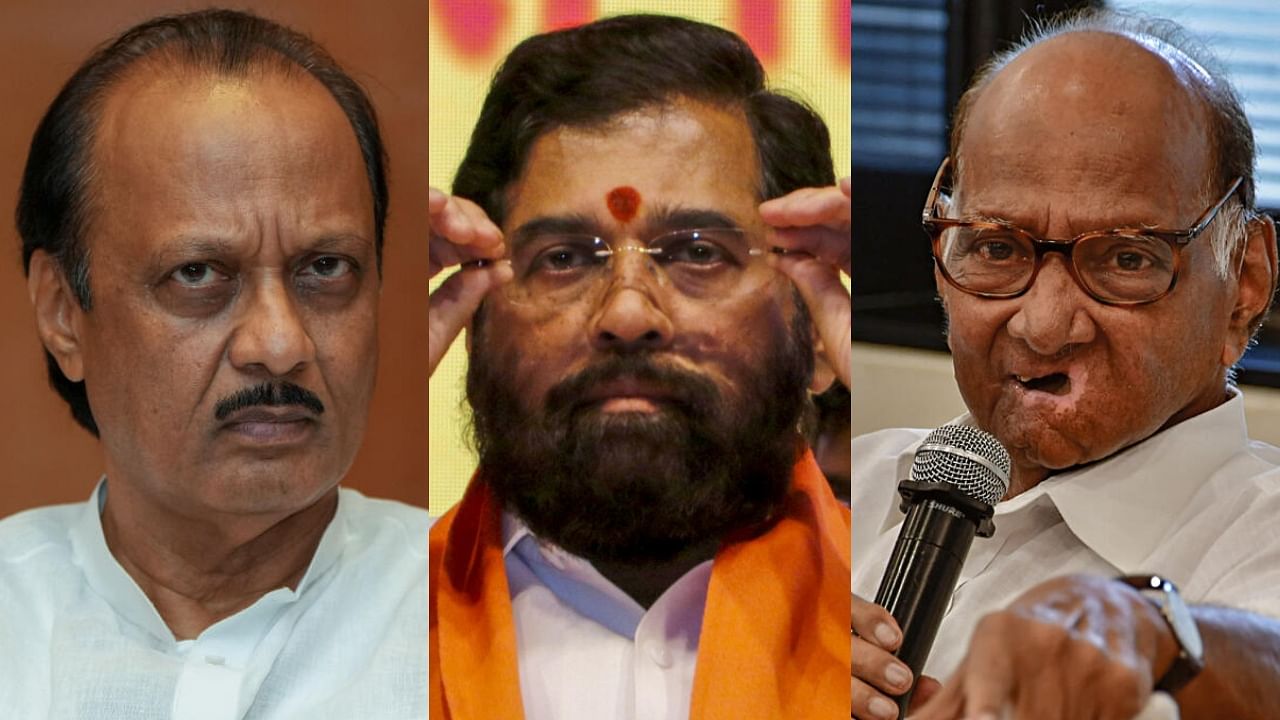
Ajit Pawar, Ekanth Shinde, Sharad Pawar
Credit: PTI File Photo
Mumbai: The serene coastal belt of Maharashtra, including Mumbai, offers an interesting backdrop for a showdown between Mahayuti and MVA alliances in the next month's assembly elections, especially between two rival Shiv Senas.
The most urbanised and industrial region, including Mumbai metropolitan area, sends 75 MLAs to the assembly and 12 members to Lok Sabha.
The coastal Konkan division in Maharashtra, spread from Sindhudurg to Mumbai, also covers Palghar, Thane, Raigad and Ratnagiri districts.
Voting will be held in all 288 state assembly constituencies on November 20 and results will be declared on November 23.
In the recent Lok Sabha polls, the Mahayuti alliance of Shiv Sena, BJP and NCP bagged seven seats in the Konkan region.
The BJP triumphed in Palghar, Ratnagiri-Sindhudurg and Mumbai North, while the NCP, led by Ajit Pawar, had a face-saver in Raigad where its leader Sunil Tatkare retained his seat.
The Shiv Sena won Thane, Kalyan and Mumbai North West. In the upcoming polls, former Union minister Narayan Rane, who won the Ratnagiri-Sindhudurg Lok Sabha seat, is set to play a crucial role for BJP in the Konkan region.
In Thane city, Chief Minister Eknath Shinde's Kopri-Pachpakhadi constituency, and Worli in Mumbai, where Shiv Sena (UBT) leader Aaditya Thackeray seeks re-election, are poised to be pivotal battlegrounds.
The contest primarily shapes up as a rivalry between Shiv Sena factions, raising the stakes significantly.
Urban issues are at the forefront, with housing, urban poverty and infrastructure challenges dominating discussions as the region copes with rapid population growth.
The Congress' influence has waned over the years, particularly in Mumbai, where it has ceded ground to Shiv Sena (UBT) within the Maha Vikas Aghadi (MVA).
The 75 constituencies are spread across tribal-dominated Palghar (6 seats), Thane (18), including six segments in Thane city, Mumbai (36).
Raigad, Ratnagiri and Sindhudurg districts account for 15 constituencies. The upcoming assembly elections present a complex political landscape, marked by rivalries and shifting alliances.
The state’s electoral map also includes the districts of Vidarbha, north Maharashtra, Marathwada and western Maharashtra.
As far as regional dynamics are concerned, Vidarbha with 62 assembly constituencies is politically significant, home to key leaders like Deputy CM Devendra Fadnavis, opposition leader Vijay Wadettiwar, state Congress chief Nana Patole and his BJP counterpart Chandrashekhar Bawankule.
The Congress aims to regain lost ground against the BJP which has made substantial inroads in the past decade, with pressing issues such as irrigation and farmer distress.
A hotbed of Maratha quota agitation, the Marathwada region has 46 assembly segments where the Congress and Uddhav Thackeray-led Shiv Sena (UBT) are expected to have an edge over rivals.
Known as the onion belt, the north Maharashtra region holds 47 seats, with key issues centring agriculture. Heavyweights from various parties, including BJP’s Girish Mahajan, NCP’s Chhagan Bhujbal and Shiv Sena leader Gulabrao Patil, dominate the political landscape.
The Congress had won Dhule and Nandurbar Lok Sabha constituencies from this region which saw the emergence of Kunal Patil as a party leader.
With 58 assembly seats in western Maharashtra, a high-stakes rivalry is anticipated between Sharad Pawar and his estranged nephew and Deputy CM Ajit Pawar, particularly in Baramati.
A riveting battle is likely on the cards in Baramati assembly constituency between Ajit Pawar and his nephew Yugendra Pawar in the event the latter is fielded by NCP (SP).
The assembly elections are viewed as an acid test for the BJP, which has enjoyed dominance in Maharashtra over the past decade.
Following disappointing Lok Sabha results in Maharashtra in 2024 where its tally fell to 9 from the previous 23, the party is under pressure to reclaim its standing, with the Haryana victory acting as a morale-booster for the cadre.
Emerging from the shadow of Shiv Sena founder Bal Thackeray, the BJP won 122 assembly seats in 2014 but saw a decline to 105 seats in alliance with the undivided Shiv Sena in 2019.
Conversely, the Congress, buoyed by its recent performance in Lok Sabha polls in Maharashtra, aims to solidify its position within the MVA alliance and increase its seat count.
In the 2019 assembly elections, Congress won 44 seats despite several leaders crossing over to BJP.
The poll outcome five years ago reflected the state's complex political landscape in regional tallies. After the Shiv Sena split in June 2022, two byelections were held in which Sena (UBT) won the Andheri (east) seat in Mumbai and Congress wrested the Kasba segment from BJP.
In 2019, the region-wise party tally was as follows:
Mumbai/Thane/Konkan (75) - Shiv Sena 29, Congress 4, BJP 27, CPM 1, Bahujan Vikas Aghadi 3, Samajwadi Party 2, NCP 6, MNS 1 and Independents 2.
Marathwada (46) - BJP 16, Shiv Sena 12, Congress 8, NCP 8, RSP 1, PWP1.
Western Maharashtra (58) - NCP 20, Congress 11, BJP 17, Shiv Sena 5, Jansurajya Shakti Party 1, Independents 4.
North Maharashtra (47) - Congress 7, NCP 13, BJP 16, AIMIM 2, Krantikari Shetkari Paksh 1, Shiv Sena 6, Independents 2.
Vidarbha (62) - BJP 30, Congress 15, Shiv Sena 4, NCP 5, Prahar Janshakti Party 2, Swabhimani Paksh 1, Independents 5.